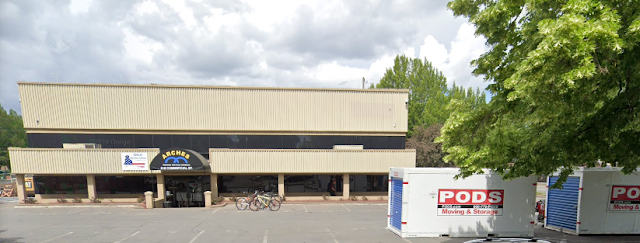By Sarah Owens and Michael Livingston
Last night (11/23/20), City Council approved DevNW's application for the map/zone changes needed to allow them to transform the Evergreen Baptist Church property at Cottage and D streets into 19 apartment units. The Planning Commission approved the application, but the Grant neighborhood association appealed the decision. Grant opposed the project at every step in the process, relying in the main on a floodgates argument against the dreaded scourge of multi-family/low-income housing (aka, "luxury high rise" apartments).
 |
| Grant rep Paul Tigan argues Council should disapprove the DevNW project |
Shortly before 10 p.m., Councilor Hoy finally moved staff recommendation to affirm the Planning
Commission decision with an amendment to the lower maximum height from
50 to 40 ft. Seconded by Lewis. Aye: Hoy, and Councilors Lewis,
Nordyke, Ausec, Andersen, Leung, and Nanke. Nay: Mayor Bennett, who
not for the first time opted to benefit himself politically rather than
fulfill his duty to follow the requirements of City code. "This could
have been resolved with more time and more consultation with the
neighborhood", he baselessly claimed, after spending much of the nearly
three-hour hearing interrupting with
leading questions, shaking his head over answers, and repeatedly
signaling his bias in favor of the Grant neighborhood association. Bennett represents the City of Salem on the Mid-Willamette Valley Homeless Alliance Board of Directors.
Council had, back in June, sided with Grant resident and former Councilor Cara Kaser in opposing the project, forcing developer DevNW to redesign the project and resubmit the site plan. See "'Progressive' Council Snuffs Affordable Hsg Project" (20 June 2020). For her part in that decision, Kaser was investigated by the Oregon Government Ethics Commission. In late October, she entered into a stipulated final order with OGEC in which she agreed she'd violated ORS 244.120(2). See November 6, 2020 Meeting Materials at page 123. The situation recently led at least one observer to conclude:
It is the Neighborhood Association and the City, not the developer, who has left evidence for bad faith. Until someone turns up evidence that is more than merely conjecture and hypothetical, the developer here deserves the benefit of any doubt or uncertainty.”
"City Council, November 23rd - Affordable Homes and German Baptist Church Project." (20 November 2020, Salem Breakfast on Bikes.) See also Harrell, S. "Former Salem city councilor faced ethics complaint for failing to disclose potential conflict of interest ." (23 November 2020, Salem Reporter.) Harrell, S. "More affordable housing is on the way after Salem City Council approves church property conversion." (24 November 2020, Salem Reporter.)
While it's never too late to do the right thing, the Grant neighborhood association deserves no credit here, because they opposed the project throughout, as did Mayor Bennett, for the flimsiest of reasons. While a majority of Council did finally approve the application, that doesn't begin to undo the damage. Their bad faith refusal to fund the project back in June not only encouraged Grant to continue opposing the project, but also delayed development, raised costs, and generally made it look as though Salem doesn't really want or need all the quality low-income housing that's offered it. No question that Council got this one mostly wrong.
In other news, the Men's Mission reopened last week after closing due to a C19 outbreak. Loew, T. "Salem's largest homeless shelter reopens after COVID-19 outbreak." (19 November 2020, Statesman Journal.)(C19 winter capacity 110, down from 198) Alexander, R. "As temperatures drop, Salem's largest homeless shelter sees Covid outbreak" (9 November 2020, Salem Reporter.) Loew, T. "COVID-19 outbreak closes Union Gospel Mission shelter, store in downtown Salem." (9 November 2020, Statesman Journal.) UGM managed to isolate affected guests, no thanks to the Marion County Health Department, which seems to have been largely MIA on the pandemic front. Harrell, S. "Marion County has spent more than $1 million on a hotel for Covid respite. Most of its rooms have sat empty," (18 November 2020, Salem Reporter.) There is a good chance Salem could gain additional shelter spaces through Project Turnkey. See Radnovich, C. "Oregon lawmakers approve $35 million for homeless shelters amid pandemic, recession." (10 November 2020, Statesman Journal.) Awards are expected to be announced in late January/February 2021.
11/25/20 update: added cite to Salem Reporter coverage
12/18/20 update: Monday last, Council was asked again to approve HOME funding for the DevNW project (as Amendment #2 to the 2020-2021 Annual Action Plan). It did so 6 (Andersen, Ausec, Bennett, Hoy, Lewis, Nordyke) to 1 (Nanke -- no reason given), with zero remarks from the Mayor. Recall that Bennett had chastised staff (and Council?) last month, for "looking at investing City money in this [project, which] makes me
increasingly uncomfortable that we haven't looked at this closely
enough. I hope in the future we'll look very closely at these kinds of
issues." See "'I do not understand the Mayor'." (1 December 2020) and "'Progressive' Council Snuffs Affordable Hsg Project" (20 June 2020).










